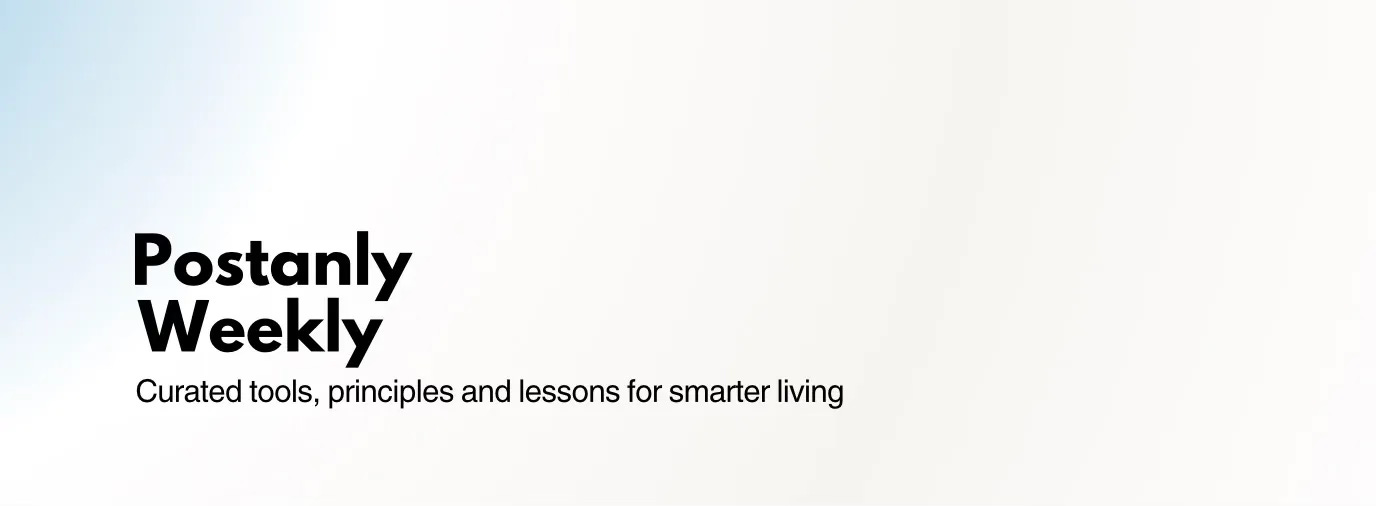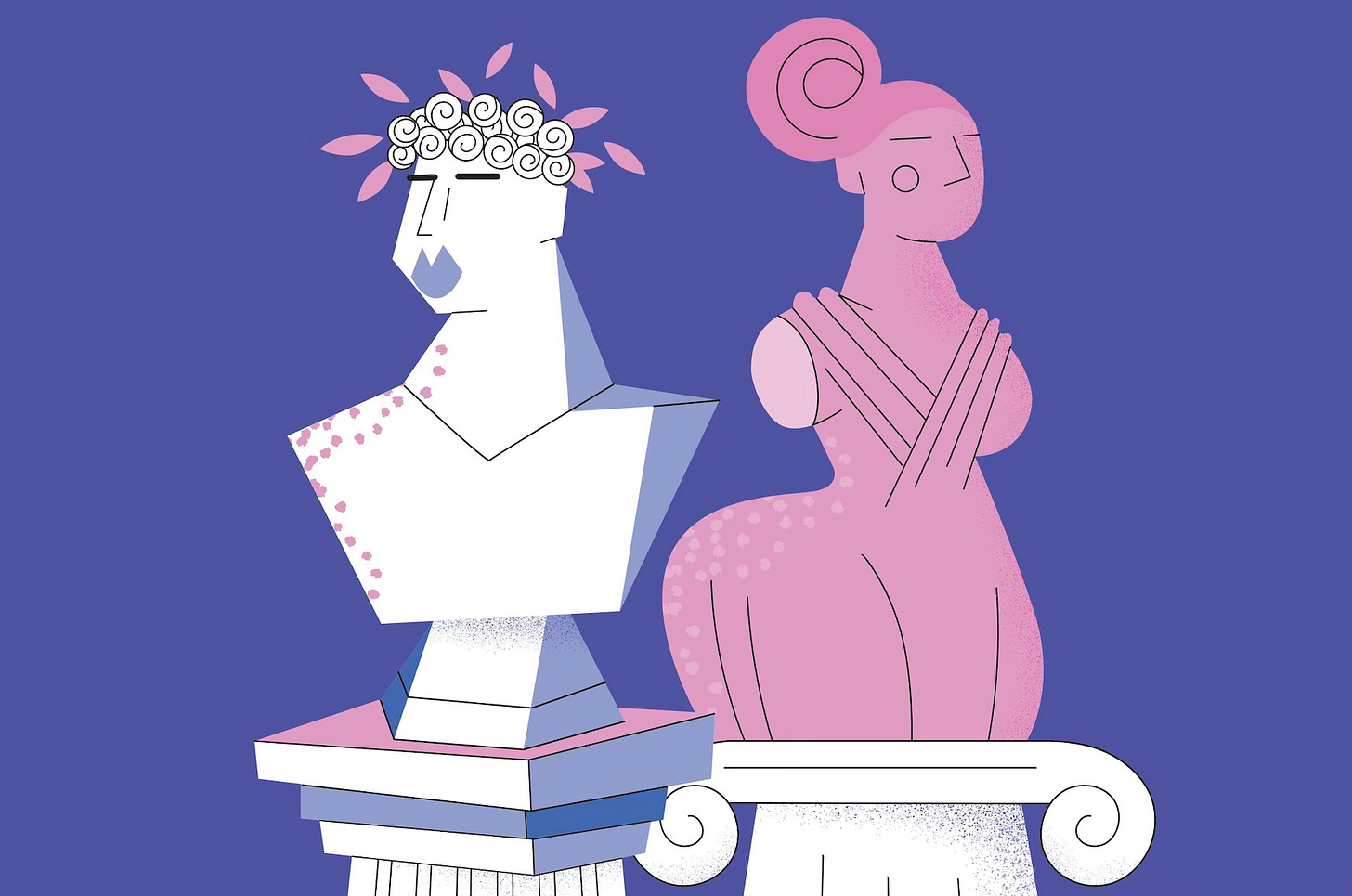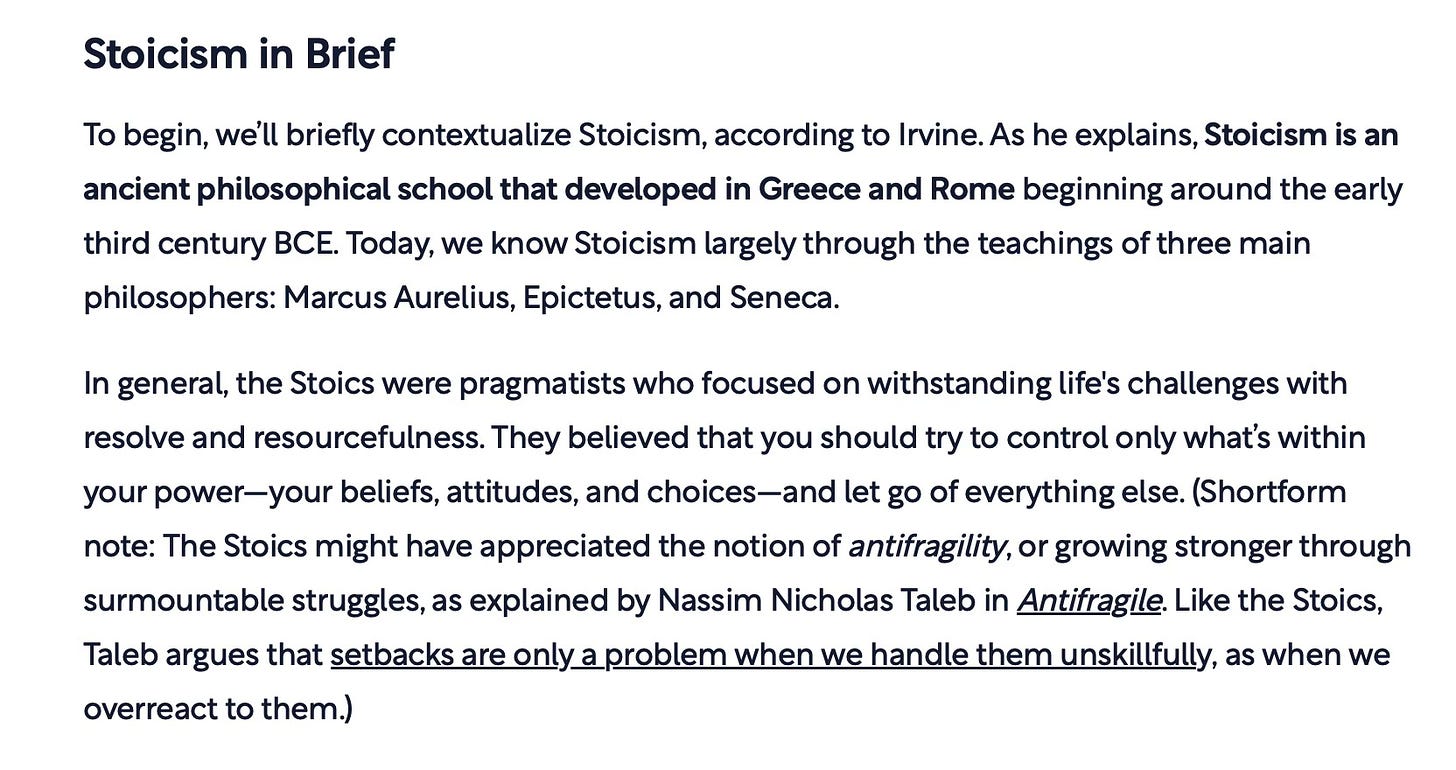The Stoic Way to Handle Stress (From Resilience to Antifragile)
The One Stoic Quote That Will Piss You Off, Then Transform You
Postanly Weekly is a reader-supported newsletter. To support my work, you can upgrade to a paid subscription for $9 per month or $60 for an entire year. Or use this special link for 50% off forever. Plus free access to The Thinking Edge: 27 (with future updates) thinking tools, models, principles for life and career. Inspired by the wisdom of brilliant minds.
Launching soon: The Kaizen Method. Transform your life with Japan’s proven habit formula. I’ll teach you how to make change feel doable and enjoyable. Tools you can use immediately. Tiny habit loops that compound. Simple systems that don’t rely on willpower. It’s my go-to for building better habits. You build momentum. You feel in control. You can apply it anywhere.
In partnership with Shortform
Self-improvement books are indispensable for personal growth. But their actionable ideas and lessons are not always easy to find. Shortform is an easily digestible solution to this obstacle. The summaries and the vast library of the most impactful self-help books can help you learn and apply wisdom faster.
Shortform distills each book's core ideas with chapter breakdowns, analysis, commentary, and even counterpoints from other sources, allowing you to get the most of books fast. They have all of my favourite books on self-improvement. Shortform doesn’t stop at books. They’ve got guides for articles and podcasts. Experience a new level of personal growth with Shortform.
Postanly readers get a free trial and 20% discount on the annual subscription.
Stress is inevitable. We can’t wish it away. But it doesn’t have to crush us. In fact, you can rise above the chaos of life. You can build mental toughness and handle the many challenges of life like a stoic.
Stoic philosopher Epictetus’ dichotomy of control has changed everything for me. How I react to the many experiences of life has significantly changed.
Today, I apply it to almost every life experience. I use it as a mindset filter before I decide what to do next. No more panicking about things I have absolutely no control over. No. I won’t do it. It’s not worth it.
For every event in life, I ask myself, “Is this within my control?” If it is, I channel my energy into proactive steps to resolve it. If not, I embrace the art of letting go. It’s a mental discipline that builds resilience and paves the way for antifragility. As he puts it in his book, Enchiridion: “Some things are within our power, while others are not. Within our power are opinion, motivation, desire, aversion, and, in a word, whatever is of our own doing; not within our power are our body, our property, reputation, office, and in, in a word, whatever is not of our own doing.”
You’ve probably read a version of the above quote on Medium or elsewhere on the internet. But have you tried applying it in life in stressful situations?
Transforming your response to stress like a Stoic is a game-changer. The Stoic mindset shift is about taking control of your reactions, focusing on what’s within your influence, and letting go of the rest.
It’s as simple as that. But there’s more.
You can easily handle stress like a stoic when you hone the skill of distinguishing between what’s essential and what’s trivial.
For example, you can’t control what people say, do and react on the road. Road rage puts you in a bad mood. You don’t want that whilst driving. But you can control how you react. If you focus on your attitude and actions, you can minimise your stress. As Stoic philosopher Seneca puts it, “He suffers more than necessary, who suffers before it is necessary.” That means not getting caught up in needless frustration but focusing on what truly matters.
Leverage your superpower. “You have power over your mind — not outside events. Realise this, and you will find strength,” says Roman emperor and stoic philosopher Marcus Aurelius. Handling stress like a Stoic is about mastering your response to external events and growing stronger, not in spite of stress but because of it. It’s a transformative shift that empowers you to become unshakable in the face of life’s uncertainties. Adopting the stoic approach to stress ties well with Epictetus’ “Inner Citadel” — fortifying your inner sanctuary. And make it less susceptible to stressors.
“The chief task in life is simply this: to identify and separate matters so that I can say clearly to myself which are externals not under my control, and which have to do with the choices I actually control. Where then do I look for good and evil? Not to uncontrollable externals, but within myself to the choices that are my own…” Epictetus said. The message is simple: focus on what you can and let the rest go.
Now, let’s talk about resilience — the ability to bounce back from curveballs. Mental resilience is like a muscle. The more you use it, the stronger it gets. Resilient people aren’t afraid of pain or difficulty. They know that it’s a normal part of life. But they also realise they have the strength to cope with whatever comes their way.
Mental resilience is like having a superpower for life. It’s the ability to take whatever punches life throws at you and come out of it even stronger. It’s not about avoiding pain or difficulties because, let’s face it, we all go through tough times. It’s about learning how to deal with them in a way that doesn’t break you. Mental resilience is the courage to keep going, no matter what. Or better still, use every experience to become a better, wiser, and stronger version of yourself. It’s that inner fire that keeps burning, no matter how strong the winds of adversity blow.
The mentality that can say, “I might bend, but I won’t break.”
Think of it this way: every challenge you face is like a workout for your mind. It might be tough, and you might stumble, but in the end, it’s making you mentally stronger. Just like working out in the gym builds physical strength, facing and overcoming challenges builds mental strength. So, when life throws curveballs, face them head-on. Use them as stepping stones to your personal growth and success. Reframe setbacks as opportunities for growth.
J.K. Rowling once said, “It is impossible to live without failing at something unless you live so cautiously that you might as well not have lived at all, in which case you have failed by default.” That’s the essence of resilience — choosing to live fully despite the many failures you come across.
Resilience → antifragility
To evolve from mental resilience to antifragility is a whole new level.
As Nassim Nicholas Taleb puts it in his book, Antifragile: Things That Gain from Disorder, “Antifragility is beyond resilience or robustness. The resilient resists shocks and stays the same; the antifragile gets better.”
Start by exposing yourself to controlled stressors, like physical exercise. Just as our muscles grow stronger when stressed, our minds and bodies become more robust when we face adversity. Gradually expand your comfort zone, taking calculated risks and learning from failures. The path to antifragility involves embracing uncertainty and volatility, not just enduring it.
Seek growth through adversity.
Adapting to unforeseen circumstances. In the process, you’ll become not just resilient but truly antifragile — thriving in the face of chaos.
For every obstacle, experience, difficulty or challenge, ask yourself, “How can I benefit from this?” Surround yourself with diverse perspectives and ideas, as exposure to various viewpoints can fortify your adaptability.
The mental step from resilience to antifragility is a shift from reacting to stress to proactively seeking it as a catalyst for improvement.
Or, as Aurelius says, pour fire into your obstacles. “Fire feeds on obstacles,” he wrote. You will emerge more powerful than before. It’s the key to becoming antifragile. Developing antifragility also means embracing a certain level of uncertainty and randomness. Nassim Nicholas Taleb emphasises that you need discipline to be a contrarian. A risk taker. To think through and act based on your convictions, not someone else’s opinions.
Make decisions that can withstand unexpected shocks.
Take calculated risks in your career, investments, or personal life to expose yourself to various outcomes. The trial and error process will contribute to your antifragility. Becoming antifragile also means embracing the concept of optionality. Nassim Nicholas Taleb encourages us to “Go for the asymmetrical bets, the positive Black Swans.”
That means taking actions that have limited downside but significant upside potential. And exploring opportunities that can yield unexpected benefits in unpredictable environments. Victor Frankl wisely said, “When we are no longer able to change a situation, we are challenged to change ourselves.” Make peace with life’s challenges, learn from them, and let them empower you to become stronger under stress.
Don’t overprotect yourself from discomfort.
“Difficulty is what wakes up the genius, ” writes Taleb.
Just as overly sterile environments can weaken the immune system, avoiding all stressors can hinder your antifragility. Embrace calculated exposure to adversity, knowing that it’s a catalyst for your growth.
Transitioning from resilience to antifragility means evolving into a dynamic, adaptable, and growth-oriented person. Learn to adapt and pivot quickly when circumstances change. You will not only endure stress but flourish in its presence.
Transcend volatility — experiment with different paths and learn from them. As Taleb advises, seek barbell strategies — situations where you have limited downside and unlimited upside. “If you want to become antifragile, put yourself in the situation “loves mistakes” — to the right of “hates mistakes” — by making these numerous and small in harm. We will call this process and approach the “barbell” strategy,” he writes.
In summary, to handle stress like a stoic, you must become a keen observer of your own experiences. Keep a journal or use reflective practices to analyse your responses to stressors. The new self-awareness will help you learn from your reactions and adjust your habits.
Free post on Medium
>The One Stoic Quote That Will Piss You Off, Then Transform You
People won’t change for you. They will still be irritating. They’ll interrupt. They’ll be rude for no reason. That doesn’t go away. But your peace of mind doesn’t have to go with them. You can detach from the experience. They will always have their flaws. You will always have yours. Don’t spend your life reacting.
Escape your own faults.
Book of the week
Every one of us experiences hardship, often on a daily basis. But what if we didn’t have to suffer it? In The Stoic Challenge, William B. Irvine argues that minimizing suffering isn’t just possible—it’s something that people have been doing since the Stoics, a group of ancient Greco-Roman philosophers, pioneered a strategy to approach adversity as opportunity.
Shortform summary highlight:
Ralph Waldo Emerson on making each day a masterpiece
“Finish every day and be done with it. For manners and for wise living it is a vice to remember. You have done what you could; some blunders and absurdities no doubt crept in; forget them as soon as you can. Tomorrow is a new day; you shall begin it well and serenely, and with too high a spirit to be cumbered with your old nonsense. This day for all that is good and fair. It is too dear, with its hopes and invitations, to waste a moment on the rotten yesterdays.”
My new books on doing life right (for free or donate what you want)
Personal growth tools I use
> Brain food, delivered daily — Every day Refind analyses thousands of articles and send you only the best, tailored to your interests. Loved by 530,181 curious minds. Subscribe for free.
> Newsletters to enhance your learning — This is a summary of thought leaders and publications. Productivity, finance, healthy-living, self-improvement, career growth and more. Discover newsletters.
Until Next Week,
Be Well.
Thomas
A great challenge of life: Knowing enough to think you are right, but not knowing enough to know you are wrong. – Neil deGrasse Tyson
Postanly Weekly is a reader-supported newsletter. To support my work, you can upgrade to a paid subscription for $9 per month or $60 for an entire year. Or use this special link for 50% off forever. Plus free access to The Thinking Edge: 27 (with future updates) thinking tools, models, principles for life and career. Inspired by the wisdom of brilliant minds.







I have spent years in men's groups and have watched with interest the paradox where the men most interested in stoicism are already the most stoic and could most benefit from feeling deeply (especially grief). Meanwhile the guys least interested are the ones who could benefit from it the most as they get lost in reactivity. Western culture already pushes men to appear stoic but real stoicism has deep roots.